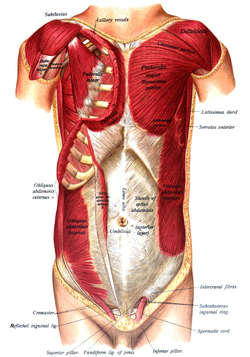Pectoralis major
| Pectoralis major | |
|---|---|

Superficial muscles of the chest and front of the arm.
|
|

The trunk viewed from the front, showing the pectoralis major to the right. (To the left it is removed showing underlying structures, among other the pectoralis minor.)
|
|
| Details | |
| Origin |
Clavicular head: anterior border of the medial half of the clavicle. Sternocostal head: anterior surface of the sternum, the superior six costal cartilages, and the aponeurosis of the external oblique muscle |
| Insertion | Lateral lip of the bicipital groove of the humerus (anteromedial proximal humerus) |
| Artery | pectoral branch of the thoracoacromial trunk |
| Nerve |
lateral pectoral nerve and medial pectoral nerve Clavicular head: C5 and C6 Sternocostal head: C7, C8 and T1 |
| Actions |
Clavicular head: flexes the humerus Sternocostal head: extends the humerus As a whole, adducts and medially rotates the humerus. It also draws the scapula anteriorly and inferiorly. |
| Identifiers | |
| Latin | Musculus pectoralis major |
| MeSH | A02.633.567.775 |
| TA | A04.4.01.002 |
| FMA | 9627 |
|
Anatomical terms of muscle
[]
|
|
The pectoralis major (/ˌpɛktəˈreɪlᵻs ˈmeɪdʒər/) (from Latin: pectus, breast) is a thick, fan-shaped muscle, situated at the chest (anterior) of the human body. It makes up the bulk of the chest muscles in the male and lies under the breast in the female. Underneath the pectoralis major is the pectoralis minor, a thin, triangular muscle. In sports as well as bodybuilding, the pectoral muscles may colloquially be referred to as "pecs", "pectoral muscle" or "chest muscle".
It arises from the anterior surface of the sternal half of the clavicle; from breadth of the half of the anterior surface of the sternum, as low down as the attachment of the cartilage of the sixth or seventh rib; from the cartilages of all the true ribs, with the exception, frequently, of the first or seventh and from the aponeurosis of the abdominal external oblique muscle.
From this extensive origin the fibers converge toward their insertion; those arising from the clavicle pass obliquely downward and outwards (laterally), and are usually separated from the rest by a slight interval; those from the lower part of the sternum, and the cartilages of the lower true ribs, run upward and laterally, while the middle fibers pass horizontally.
They all end in a flat tendon, about 5 cm in breadth, which is inserted into the lateral lip of the bicipital groove (intertubercular sulcus) of the humerus.
...
Wikipedia
